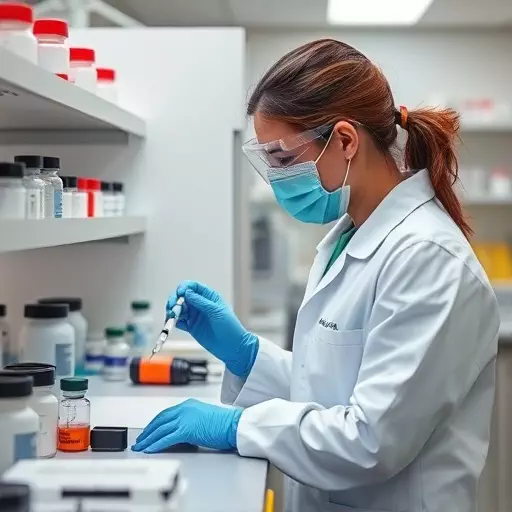In Detroit-Livonia-Dearborn, lab work through wastewater-based epidemiology (WBE) is a powerful tool for combating substance abuse and tracking antimicrobial resistance (AMR). These labs identify drug usage patterns, guide interventions, and support public health vaccination campaigns by providing data-driven insights. They also unravel complex AMR mechanisms, enabling informed decisions and proactive strategies to preserve antibiotic efficacy. The role of labs in Detroit-Livonia-Dearborn is crucial for shaping effective public health responses, from surveillance to targeted outbreak control.
“Unveiling hidden drug usage trends and their impact on public health is now possible through an innovative approach—wastewater-based epidemiology. This article explores the transformative power of this method in Detroit-Livonia-Dearborn, where lab work plays a pivotal role in understanding local drug dynamics. We delve into how advanced laboratories are the unsung heroes in combating antimicrobial resistance and enhancing vaccination campaigns. By analyzing wastewater, these facilities provide critical insights, enabling health officials to make data-driven decisions and proactively address public health challenges.”
- Uncovering Drug Usage Trends: The Power of Wastewater Analysis in Detroit-Livonia-Dearborn
- The Crucial Role of Laboratories in Combating Antimicrobial Resistance
- Enhancing Public Health Vaccination Campaigns Through Advanced Laboratory Work
Uncovering Drug Usage Trends: The Power of Wastewater Analysis in Detroit-Livonia-Dearborn

Uncovering Drug Usage Trends: The Power of Wastewater Analysis in Detroit-Livonia-Dearborn
In the battle against substance abuse and its associated public health risks, innovative methods are crucial for understanding local drug usage trends. One such method gaining traction is wastewater-based epidemiology (WBE), which offers a unique window into community health through the analysis of sewage. This approach has proven particularly valuable in Detroit-Livonia-Dearborn, where lab work plays a pivotal role in monitoring and controlling antimicrobial resistance—a growing concern in healthcare. By examining wastewater samples, researchers can identify not only prevalent drugs but also their concentrations, providing insights into usage patterns and helping to guide targeted interventions.
The labs in this region play a vital part in implementing public health vaccination campaigns by offering advanced diagnostic capabilities and data-driven insights. This includes tracking the presence of various substances, allowing healthcare authorities to respond swiftly to emerging trends. Furthermore, WBE contributes to our understanding of how drug use impacts local ecosystems and communities, fostering more effective strategies for harm reduction and prevention.
The Crucial Role of Laboratories in Combating Antimicrobial Resistance

In the ongoing battle against antimicrobial resistance (AMR), laboratories, especially those engaged in lab work in Detroit-Livonia-Dearborn, play a pivotal role. These facilities are at the forefront of surveillance and research, providing essential insights into the evolving landscape of drug-resistant pathogens. By analyzing wastewater, labs can uncover hidden trends in antibiotic usage within communities. This data is crucial for public health authorities to make informed decisions regarding AMR management and the implementation of effective vaccination campaigns.
The role of laboratories extends beyond detection; they also contribute to solving the complex puzzle of AMR. Through advanced testing methods and cultural techniques, researchers can identify emerging resistance mechanisms, enabling the development of targeted interventions. Moreover, labs facilitate the monitoring of the success or failure of public health strategies, allowing for rapid adjustments to stay ahead of drug-resistant infections. This proactive approach is key to preserving the effectiveness of antimicrobial therapies in the years to come.
Enhancing Public Health Vaccination Campaigns Through Advanced Laboratory Work

In the fight against infectious diseases, lab work plays a pivotal role, especially in the context of public health vaccination campaigns. Advanced laboratory analysis in regions like Detroit-Livonia-Dearborn is crucial for understanding and tracking emerging health trends. By examining wastewater samples, researchers can uncover valuable insights into drug usage patterns and the spread of antimicrobial resistance (AMR). This data-driven approach enables healthcare officials to make informed decisions regarding vaccination strategies.
The importance of labs extends beyond surveillance; they are instrumental in implementing effective public health responses. Through meticulous lab work, scientists can identify circulating strains of pathogens, monitor antibiotic susceptibility, and predict potential outbreaks. These insights facilitate the development of targeted vaccination campaigns, ensuring that resources are allocated efficiently to control infectious diseases and reduce the burden on healthcare systems.
